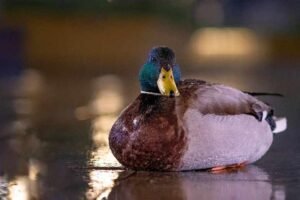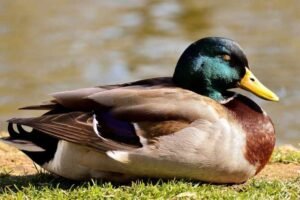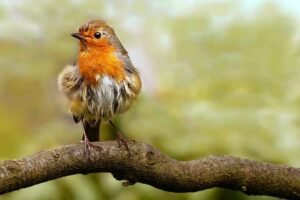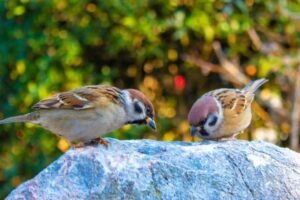Can ducks eat cilantro? Absolutely yes! Cilantro, a garden herb also known as coriander, is safe for ducks to consume. This herb is a great addition to your flock’s diet and is packed with some amazing nutrients, including potassium, zinc, phytonutrients, phenolic compounds, flavonoids, vitamin A, C, and K. Plus, this herb is low in calories, making it a perfect choice for your duck. Owners can serve cilantro to their ducks alone or with other treats.
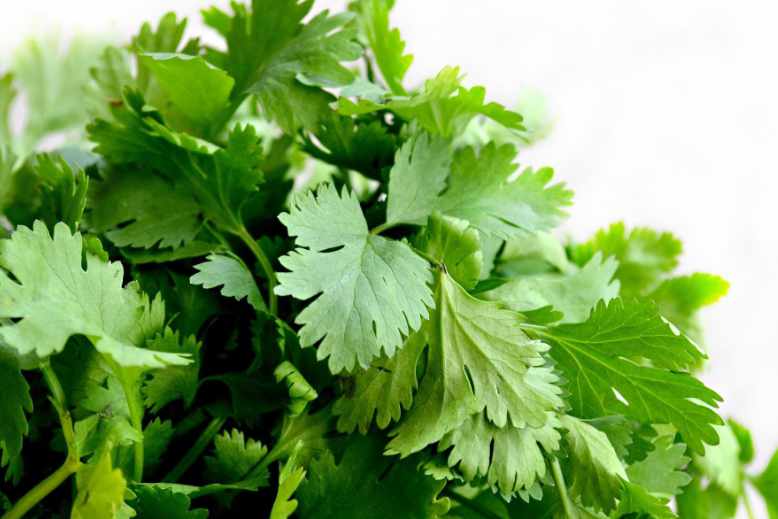
It is no secret that ducks will devour just about anything! So if you have grown cilantro in your garden and your ducks like to munch on the greens every once in a while, you might be wondering if it is okay for the little fellas to eat cilantro. Cilantro being a strong flavour herb, is great for humans, but can ducks have it? Also, what parts of this plant your flock can enjoy, and what are the health benefits of introducing this treat to the ducks?
Together, we find out!
Can ducks eat cilantro?
The answer to “can ducks eat cilantro” is a definite yes.
This herb is a great source of protein and can be fed to ducks regularly. It promotes healthy growth in younglings and boosts the immune system of adult ducks. You can offer cilantro to your flock as a part of their diet to fulfil their dietary supplement requirements. Scattering the cilantro leaves around ducks’ nesting and feeding area prevents fungal growth and keeps your flock looking at its best.
Is cilantro poisonous for ducks?
No.
Cilantro poses no threat to the well-being of ducks as it does not contains any toxic substances. Instead, it offers many vitamins, nutrients, and antioxidants to help your ducks stay fit. It is enriched with potassium vitamins A, C, K, manganese, and folate. All these nutrients help with the improvement of
- Energy levels
- Immune health
- And egg production
Health advantages of cilantro for ducks
Cilantro is considered great at keeping food poisoning in the ducks at bay. Some other health advantages of cilantro for ducks are as follows.
- Eliminates heavy metals from the body
Ducks have a bad reputation for munching on just about anything seemingly edible. While many dietary options provide nutrients, some contain heavy metals that can reside in the body’s tissues.
An abundance of these metals can lead a duck to server health concerns such as infertility, heart illnesses, and more.
Cilantro being an antioxidant, binds these free-roaming metals together, losing them from body tissues and finally eliminating them from the body.
Some food options containing heavy metals include
- Brown rice (arsenic)
- Fish (mercury)
- Dried algae (cadmium)
- Helps with digestive tract functions
Cilantro helps ducks maintain efficient digestion by producing digestive enzymes to promote the breakdown of different food particles. Its fibre content eliminates the chances of bloating and constipation in ducks by helping the edibles to flow along the digestive tract smoothly.

- Keeps bones strong and helps with immunity
Cilantro is enriched with fat-soluble vitamins K and A.
Vitamin A plays a critical role in improving a duck’s vision, and it also serves as an antioxidant to boost the immune system. This antioxidant keeps your little fellow away from numerous diseases and infections such as bumble foot and avian cholera.
Vitamin K makes your duck’s bones sturdier by activating the protein involved in a duck’s bone mineralization and formation.
What about cilantro stems?
Cilantro stems are also packed with nutrients guaranteed to benefit your duck’s health. So, yes, ducks can eat cilantro stems as well.
Cilantro stems are more flavorful than leaves, but your ducks probably don’t care about this detail. As we all know, these fellows don’t discriminate when it comes to devouring food.
Can ducks eat coriander seeds?
Cilantro is normally referred to as the stems and leaves of the plant, whereas coriander is the dried seeds of this herb.
Coriander seeds have a slightly varying nutritional profile and taste compared to the cilantro plant, but they are pretty nutritious for your flock. Thereby it is safe for ducks to consume coriander seeds.
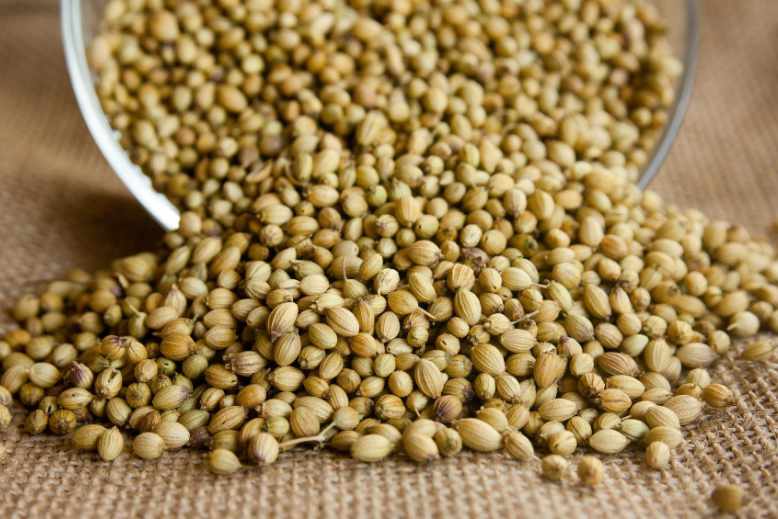
Can ducks eat grounded coriander seeds?
Though crushed or grounded coriander seeds are enriched with nutrients, your ducks probably won’t eat them as it’s in a powdered form.
Crushed coriander seeds are normally used for cooking purposes, so the real question is, can ducks consume foods cooked with grounded coriander?
Yes, Ducks can eat food cooked with crushed coriander as long as no other additives are mixed with the food. Diets having a higher content of additives like salt can lead a duck to produce eggs with non-existent or thin egg shells.
Ducks are sensitive creatures, and even a slight increase in salt level can lead them to different digestive problems. That’s why it is best to only feed your duck fresh and free from additive cilantro. Cooking this herb also eliminates the essential nutrients and vitamins your duck’s body may need to stay healthy.
Lastly, do not offer your duck anything that is heavily processed or contains extra salt or preservatives.
Can baby ducks eat cilantro?
Yes, baby ducks can eat cilantro as it could help them reach their maximum growth potential.
You can make cilantro a part of your duckling’s diet once they are 8 weeks and above. By this age, they would have developed a digestive system that can break down all the necessary nutrients available in cilantro.
The best way to ensure a duckling is getting a well-balanced diet is to make cilantro an occasional part of the overall nourishment. Where the key component should always be formulated-starter feed.
Lastly, ducklings should not consume food cooked with cilantro as such food items tend to have additives. Also, for juvenile ducks, cutting the stems into digestible pieces is advised to eliminate the risk of choking. These little munchkins may need some time to adjust to the strong flavour of this plant, but if they like the taste, it’s a great addition to a duckling’s diet.
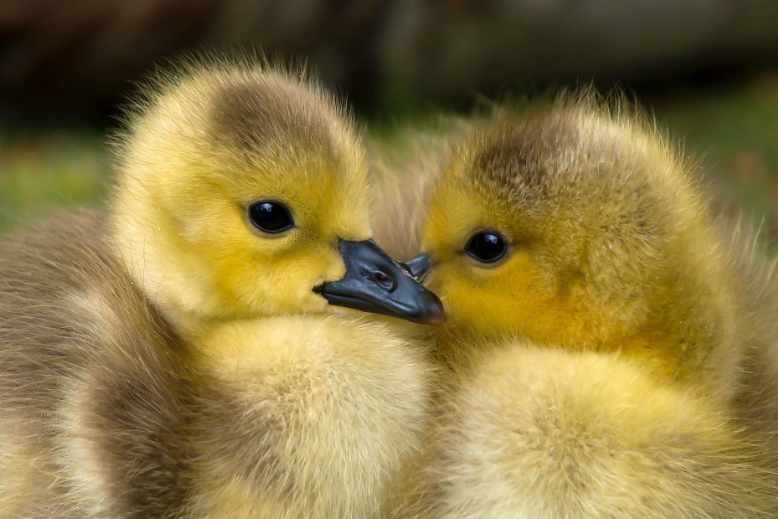
How often do I feed my ducks with cilantro?
Now that you know cilantro offers no toxicity threat to the ducks, that does not mean you should mix cilantro with every meal you offer. Remember, moderation is always the key, no matter how good a treat is.
Cilantro is a treat, and it should be seen as one. This means you should only feed cilantro occasionally as it isn’t something you can always serve.
Moreover, treats should not account for more than 5% of the entire meal you serve your ducks for the day. This will ensure the right proportion of essential nutrients in all diets.
If you have an abundance of cilantro at your disposal, do not feed them more than two times a week.
Can ducks eat cilantro leaves?
Yes, ducks can consume cilantro leaves. In fact, many owners prefer offering fresh cilantro leaves to their Ducks so they can consume them well.
You can serve cilantro leaves to the Ducks in two ways. First, grab some fresh leave from the garden and place them in your duck feeder for the avian friends to enjoy.
Another acceptable way is to mix the leaves with fresh water in a clean bowl and give the bowl to the ducks. They will eat the leaves while hydrating themselves.
What other herbs can ducks eat?
Cilantro is an excellent treat for ducks, but what other herbs can boost your duck’s overall health?
Here is the list
- Mint
- Thyme
- Sage
- Parsley
- Calendula
- Lavender
- Oregano
Final words
So, can ducks eat cilantro?
The answer is a definite yes.
Ducks, whether young or adult, can enjoy this herb in different forms. However, it should be considered a supplement to commercial feed, not a staple of a duck’s regular diet. Also, never offer mouldy cilantro to your ducks, and always prefer fresh or free from additives cilantro.
Follow this guide, and we are sure cilantro will make a perfect addition to your duck’s occasional diet.
Peace!

